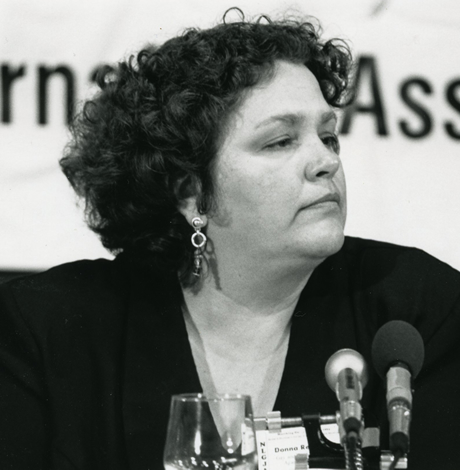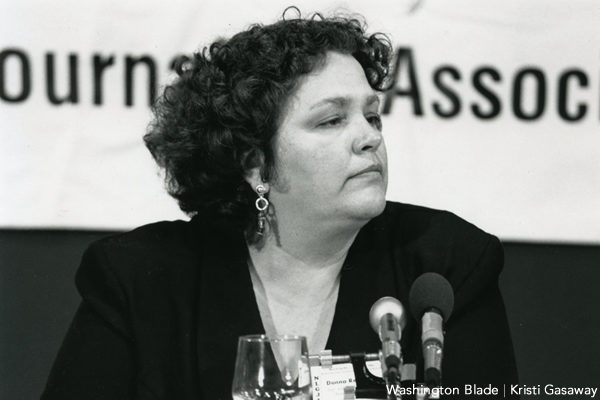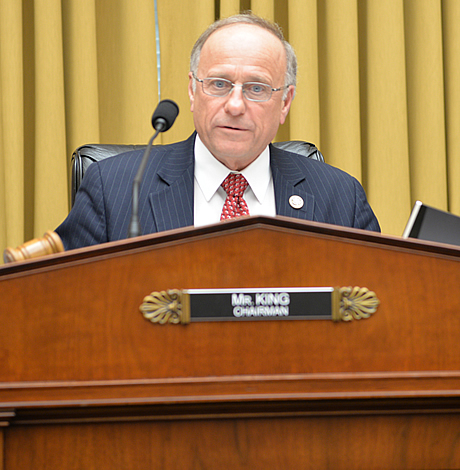National
Longtime LGBT advocate in Iowa dies after battle with cancer
Donna Red Wing oversaw LGBT activism after state enacted marriage equality


Donna Red Wing, shown here in 1994, was an LGBT advocate in Iowa who died at age 67 after a battle with cancer. (Washington Blade archive photo by Kristi Gasaway)
A longtime LGBT advocate in Iowa who oversaw victories in her state that included marriage equality and the loosening of restrictions on her state’s HIV criminalization law has died after a battle with lung cancer, One Iowa announced Tuesday morning.
Donna Red Wing, who served as executive director of One Iowa from 2012 to 2016, died Monday evening at age 67 after an eight-month battle with lung cancer, according to the Des Moines Register. Red Wing is credited with dedicating more than 30 years of her life to the fight for LGBT rights in Iowa as well as D.C. and around the country.
Daniel Hoffman-Zinnel, the current executive director of One Iowa, said in a statement Red Wing was “a force to be reckoned with and will be greatly missed by individuals across the country.”
“Donna inspired so many including myself,” Hoffman-Zinnel said. “I was lucky enough to get to know her when she first came to Iowa and co-founded One Iowa’s LGBTQ Health & Wellness Conference. I wouldn’t be where I am today without Donna’s support and mentorship.”
Once dubbed “the most dangerous woman in America” by the Christian Coalition, Red Wing was known for her charisma and civil approach to activism. In addition to leading One Iowa for four years, she briefly served as director of the Eychaner Foundation, a non-profit that awards scholarships to students who champion LGBT issues, and served on the Des Moines Civil & Human Rights Commission, where she launched an LGBT advisory council. The commission recently named its annual Lifetime Achievement award after Red Wing in recognition of her longtime work.
Active in the marriage equality movement, Red Wing took the helm of One Iowa after the state enacted same-sex marriage and supporters beat back an anti-gay constitutional amendment in the state legislature. During her tenure at One Iowa, she helped guide to passage legislation in 2014 that loosened the restrictions on HIV criminalization in Iowa, which at the time had one of the most draconian laws against people with the disease.
In 2013, Red Wing told the Washington Blade in the wake of securing marriage equality working with local HIV groups to repeal her state’s HIV criminalization law was her No. 1 legislative priority.
“Over the years, I’ve been troubled that as the face of AIDS changes, fewer and fewer LGBT organizations are engaging in this struggle,” Red Wing said. “It seems like the right thing to do, you know? Because in the early days, if it wasn’t for our people, if it wasn’t for the LGBT communities, we would not be where we are today.”
Three years later, when the Blade visited the offices of One Iowa in 2016 during presidential caucuses, Red Wing recalled in 2014 then-Gov. Terry Branstad was compelled to sign the legislation because it passed on a bipartisan basis, but looked uncomfortable at the signing ceremony.
“We had every Republican in the House and Senate signed on,” Red Wing said. “He had to [sign it]. It was bulletproof. So were we surprised? No. We were there. He didn’t look happy. He was surrounded by queers and people with HIV and had to sign it.”
Sharon Malheiro, board emeritus of One Iowa, said in a statement Red Wing’s “passion and dedication to serving the LGBTQ community was unparalleled, and I am honored to have known and worked with her.”
“Our community has lost a fierce advocate, and many of us have lost an incredible friend, mentor, and inspiration,” Malheiro added.
Prior to moving to Iowa, Red Wing worked as an LGBT activist and was executive director of grassroots leadership at the Interfaith Alliance. No stranger to national elections, Red Wing served as a co-chair of the Obama for America 2008 LGBT Leadership Council and Howard Dean’s outreach liaison to the LGBT community in 2004. Red Wing also worked at other LGBT organizations, including the Human Rights Campaign, the Gill Foundation and GLAAD.
JoDee Winterhof, the Human Rights Campaign’s senior vice president for policy and political affairs, said in a statement Red Wing “dedicated her life’s work to civil rights and her legacy will forever be woven into the fabric of the LGBTQ equality movement.”
“Many in the HRC family had the honor of working alongside Donna during her time as HRC’s National Field Director and across many states and campaigns in more recent years. For more than three decades, generations of advocates bore witness to Donna’s tenacity, deep commitment to equality and justice, and her many accomplishments, which inspired all those around her,” Winterhof said.
U.S. Supreme Court
Supreme Court to consider bans on trans athletes in school sports
27 states have passed laws limiting participation in athletics programs

The U.S. Supreme Court on Thursday agreed to hear two cases involving transgender youth challenging bans prohibiting them from participating in school sports.
In Little v. Hecox, plaintiffs represented by the ACLU, Legal Voice, and the law firm Cooley are challenging Idaho’s 2020 ban, which requires sex testing to adjudicate questions of an athlete’s eligibility.
The 9th U.S. Circuit Court of Appeals described the process in a 2023 decision halting the policy’s enforcement pending an outcome in the litigation. The “sex dispute verification process, whereby any individual can ‘dispute’ the sex of any female student athlete in the state of Idaho,” the court wrote, would “require her to undergo intrusive medical procedures to verify her sex, including gynecological exams.”
In West Virginia v. B.P.J., Lambda Legal, the ACLU, the ACLU of West Virginia, and Cooley are representing a trans middle school student challenging the Mountain State’s 2021 ban on trans athletes.
The plaintiff was participating in cross country when the law was passed, taking puberty blockers that would have significantly reduced the chances that she could have a physiological advantage over cisgender peers.
“Like any other educational program, school athletic programs should be accessible for everyone regardless of their sex or transgender status,” said Joshua Block, senior counsel for the ACLU’s LGBTQ and HIV Project. “Trans kids play sports for the same reasons their peers do — to learn perseverance, dedication, teamwork, and to simply have fun with their friends,” Block said.
He added, “Categorically excluding kids from school sports just because they are transgender will only make our schools less safe and more hurtful places for all youth. We believe the lower courts were right to block these discriminatory laws, and we will continue to defend the freedom of all kids to play.”
“Our client just wants to play sports with her friends and peers,” said Lambda Legal Senior Counsel Tara Borelli. “Everyone understands the value of participating in team athletics, for fitness, leadership, socialization, and myriad other benefits.”
Borelli continued, “The U.S. Court of Appeals for the Fourth Circuit last April issued a thoughtful and thorough ruling allowing B.P.J. to continue participating in track events. That well-reasoned decision should stand the test of time, and we stand ready to defend it.”
Shortly after taking control of both legislative chambers, Republican members of Congress tried — unsuccessfully — to pass a national ban like those now enforced in 27 states since 2020.
Federal Government
UPenn erases Lia Thomas’s records as part of settlement with White House
University agreed to ban trans women from women’s sports teams

In a settlement with the Trump-Vance administration announced on Tuesday, the University of Pennsylvania will ban transgender athletes from competing and erase swimming records set by transgender former student Lia Thomas.
The U.S. Department of Education’s Office for Civil Rights found the university in violation of Title IX, the federal rights law barring sex based discrimination in educational institutions, by “permitting males to compete in women’s intercollegiate athletics and to occupy women-only intimate facilities.”
The statement issued by University of Pennsylvania President J. Larry Jameson highlighted how the law’s interpretation was changed substantially under President Donald Trump’s second term.
“The Department of Education OCR investigated the participation of one transgender athlete on the women’s swimming team three years ago, during the 2021-2022 swim season,” he wrote. “At that time, Penn was in compliance with NCAA eligibility rules and Title IX as then interpreted.”
Jameson continued, “Penn has always followed — and continues to follow — Title IX and the applicable policy of the NCAA regarding transgender athletes. NCAA eligibility rules changed in February 2025 with Executive Orders 14168 and 14201 and Penn will continue to adhere to these new rules.”
Writing that “we acknowledge that some student-athletes were disadvantaged by these rules” in place while Thomas was allowed to compete, the university president added, “We recognize this and will apologize to those who experienced a competitive disadvantage or experienced anxiety because of the policies in effect at the time.”
“Today’s resolution agreement with UPenn is yet another example of the Trump effect in action,” Education Secretary Linda McMahon said in a statement. “Thanks to the leadership of President Trump, UPenn has agreed both to apologize for its past Title IX violations and to ensure that women’s sports are protected at the university for future generations of female athletes.”
Under former President Joe Biden, the department’s Office of Civil Rights sought to protect against anti-LGBTQ discrimination in education, bringing investigations and enforcement actions in cases where school officials might, for example, require trans students to use restrooms and facilities consistent with their birth sex or fail to respond to peer harassment over their gender identity.
Much of the legal reasoning behind the Biden-Harris administration’s positions extended from the 2020 U.S. Supreme Court case Bostock v. Clayton County, which found that sex-based discrimination includes that which is based on sexual orientation or gender identity under Title VII rules covering employment practices.
The Trump-Vance administration last week put the state of California on notice that its trans athlete policies were, or once were, in violation of Title IX, which comes amid the ongoing battle with Maine over the same issue.
New York
Two teens shot steps from Stonewall Inn after NYC Pride parade
One of the victims remains in critical condition

On Sunday night, following the annual NYC Pride March, two girls were shot in Sheridan Square, feet away from the historic Stonewall Inn.
According to an NYPD report, the two girls, aged 16 and 17, were shot around 10:15 p.m. as Pride festivities began to wind down. The 16-year-old was struck in the head and, according to police sources, is said to be in critical condition, while the 17-year-old was said to be in stable condition.
The Washington Blade confirmed with the NYPD the details from the police reports and learned no arrests had been made as of noon Monday.
The shooting took place in the Greenwich Village neighborhood of Manhattan, mere feet away from the most famous gay bar in the city — if not the world — the Stonewall Inn. Earlier that day, hundreds of thousands of people marched down Christopher Street to celebrate 55 years of LGBTQ people standing up for their rights.
In June 1969, after police raided the Stonewall Inn, members of the LGBTQ community pushed back, sparking what became known as the Stonewall riots. Over the course of two days, LGBTQ New Yorkers protested the discriminatory policing of queer spaces across the city and mobilized to speak out — and throw bottles if need be — at officers attempting to suppress their existence.
The following year, LGBTQ people returned to the Stonewall Inn and marched through the same streets where queer New Yorkers had been arrested, marking the first “Gay Pride March” in history and declaring that LGBTQ people were not going anywhere.
New York State Assemblywoman Deborah Glick, whose district includes Greenwich Village, took to social media to comment on the shooting.
“After decades of peaceful Pride celebrations — this year gun fire and two people shot near the Stonewall Inn is a reminder that gun violence is everywhere,” the lesbian lawmaker said on X. “Guns are a problem despite the NRA BS.”
-

 U.S. Supreme Court4 days ago
U.S. Supreme Court4 days agoSupreme Court to consider bans on trans athletes in school sports
-

 Out & About4 days ago
Out & About4 days agoCelebrate the Fourth of July the gay way!
-

 Virginia4 days ago
Virginia4 days agoVa. court allows conversion therapy despite law banning it
-

 Opinions5 days ago
Opinions5 days agoCan we still celebrate Fourth of July this year?










